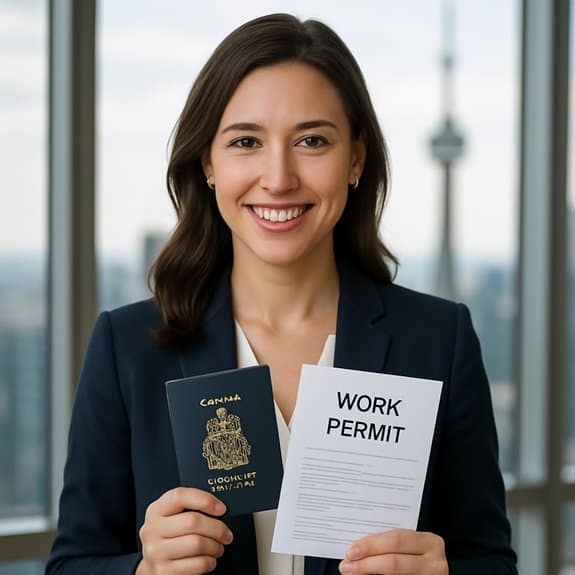
You can obtain work permits through Canada’s free trade agreements without requiring LMIA approval. These agreements cover professionals from the US, Mexico, EU countries, Chile, Peru, Colombia, Korea, Israel, Jordan, and Panama. You’ll need relevant credentials, a job offer, and proof of qualifications. Processing takes weeks instead of months, costs less, and has higher approval rates. Different categories exist including business visitors, professionals, intra-company transferees, and investors—each with specific requirements that determine your pathway to working in Canada.
Types of Free Trade Agreements Available for Work Permits
If you’re exploring opportunities to work in Canada through international agreements, understanding the various Free Trade Agreements (FTAs) that offer work permits can greatly simplify your immigration journey.
Canada has established multiple FTAs that allow foreign workers to obtain LMIA-exempt work permits. The major agreements include CUSMA (formerly NAFTA), which covers citizens from the US and Mexico in professional occupations.
Canada’s FTAs enable LMIA-exempt work permits for US, Mexican, and other foreign professionals.
CETA provides access for EU member country citizens, while bilateral agreements with Chile, Peru, Colombia, and Korea offer similar provisions. Each FTA specifies eligible occupations like engineers, accountants, scientists, and computer analysts.
Additionally, agreements with Israel, Jordan, and Panama provide specialized entry provisions. These FTAs typically cover four business categories: business visitors, professionals, intra-company transferees, and traders or investors.
LMIA Exemption Benefits and Process Advantages
The LMIA exemption stands as one of the most significant advantages when applying for work permits under Canada’s Free Trade Agreements.
You’ll bypass the lengthy Labour Market Impact Assessment process, which typically takes several months and costs employers $1,000 per application. This exemption means you won’t need to prove that hiring you won’t negatively affect Canadian workers.
The streamlined process offers compelling benefits:
- Faster processing times – receive your permit in weeks instead of months
- Lower costs – save thousands in LMIA fees and related expenses
- Reduced paperwork – submit fewer documents and supporting evidence
- Higher approval rates – avoid LMIA rejections that derail applications
Your employer can hire you quickly without demonstrating recruitment efforts or justifying why they couldn’t find a Canadian worker for the position.
Eligible Professional Categories Under FTAs
When you’re exploring work opportunities under Canada’s Free Trade Agreements, you’ll find four main professional categories that qualify for streamlined entry.
Business visitors can conduct business activities without entering the Canadian labour market directly. You’ll engage in activities like meetings, conferences, or consultations without receiving payment from Canadian sources.
Professionals include occupations explicitly listed in each FTA, such as engineers, accountants, scientists, and computer analysts. You’ll need relevant credentials and a job offer matching your qualifications.
Intra-company transferees work for multinational companies and transfer to Canadian branches. You’ll typically need specialized knowledge or executive experience.
Traders and investors either engage in substantial trade between Canada and their home country or make significant investments in Canadian enterprises. You’ll demonstrate your business activities meet specific monetary thresholds outlined in the agreements.
Country-Specific Trade Agreements and Their Provisions
Each of Canada’s international trade agreements offers unique provisions tailored to the economic relationships between partner countries.
You’ll find that CUSMA (formerly NAFTA) provides the most extensive coverage, allowing professionals from the US and Mexico to work in over 60 designated occupations.
CETA opens doors for EU citizens across various professional categories, while agreements with Chile, Peru, and Colombia focus on specific sectors like engineering and architecture.
Key benefits you’ll experience under these agreements include:
- Faster processing times – Your application moves quickly without LMIA requirements
- Greater job mobility – You can switch employers within the same profession more easily
- Family inclusion – Your spouse may qualify for an open work permit
- Career advancement – You’ll access opportunities previously restricted to Canadian citizens
Essential Requirements for FTA Work Permit Applications
Before submitting your FTA work permit application, you’ll need to gather specific documents and meet several mandatory criteria that prove your eligibility under Canada’s international trade agreements.
You must hold citizenship from a country with an active FTA with Canada and possess a valid job offer from a Canadian employer for a position covered under your agreement.
Your professional qualifications must match the occupation’s requirements, including relevant education, certifications, or work experience.
You’ll need a valid passport, proof of good health, and a clean criminal record.
The job offer must be temporary with defined start and end dates.
How to Determine Your Eligibility Under Trade Agreements
Determining your eligibility under Canada’s free trade agreements requires a systematic approach to reviewing specific requirements and matching them against your qualifications.
You’ll need to identify which FTA applies to your citizenship and verify if your occupation falls within the agreement’s designated professions. Each agreement has distinct provisions, so you must examine the specific text relevant to your situation.
Key steps to assess your eligibility include:
- Review your country’s FTA with Canada and locate the temporary entry provisions
- Match your professional qualifications against the agreement’s occupation list
- Verify you meet educational and experience requirements for your profession
- Confirm your Canadian job offer aligns with FTA specifications
Consider consulting immigration professionals who can provide detailed assessments and guarantee you’re interpreting the agreement correctly.
Application Process and Documentation Requirements
Once you’ve confirmed your eligibility under a free trade agreement, you’ll need to prepare a thorough application package that meets Immigration, Refugees and Citizenship Canada’s requirements.
You’ll submit your application online through IRCC’s portal, including your valid passport, job offer letter, and proof of professional qualifications. Your employer must provide a detailed employment offer that specifies your position, duties, salary, and employment duration.
You’ll also need educational credentials, professional licenses or certifications relevant to your occupation, and proof of work experience.
Don’t forget to pay the required fees and include any supporting documents specific to your FTA category.
Processing times vary by country and agreement type, so you should apply well before your intended start date to avoid delays.
Spousal Work Permits and Family Benefits Under FTAs
When you’re moving to Canada under an FTA work permit, your spouse or common-law partner can often qualify for an open work permit, allowing them to work for any employer without needing a specific job offer.
This benefit greatly enhances your family’s financial stability and integration into Canadian society.
Key advantages for your family include:
- Your spouse gains immediate employment authorization without employer restrictions
- Children can attend Canadian schools with access to quality education
- Your family enjoys Canadian healthcare benefits during your stay
- You’ll build stronger community connections through dual employment opportunities
These provisions vary by agreement – CUSMA and CETA offer thorough spousal benefits, while other FTAs may have limitations.
You’ll need to verify specific eligibility under your applicable agreement to confirm your family maximizes available opportunities.
How Canadian Currents Immigration Services Can Help
Maneuvering FTA work permit applications requires expertise that Canadian Currents Immigration Services provides through our seasoned team of immigration lawyers, consultants, and paralegals.
We’ll assess your qualifications against specific trade agreement criteria, guaranteeing you meet all eligibility requirements for your target FTA category.
Our decades of combined experience help streamline your application process. We’ll prepare thorough documentation, handle IRCC submissions, and provide updates throughout.
Whether you’re applying under CUSMA, CETA, or other agreements, we recognize each FTA’s unique provisions and requirements.
You’ll receive personalized guidance tailored to your situation. We’ll identify the most suitable FTA pathway, advise on professional qualification requirements, and help avoid common application pitfalls.
Our cost-effective approach guarantees you get expert legal support without unnecessary expenses, maximizing your chances of approval.

We serve ALL of Canada. Currently have offices Western Canada — Vancouver, Calgary, Edmonton, Kamloops and Red Deer. We also have the infrastructure to work with any of our clients virtually — even from the furthest regions of the Yukon to Newfoundland.
Call (778) 331-1164 [toll free 1 (844) 715-0940] to get routed to the best office for you or contact us online to schedule an appointment.
We also have a dedicated intake form to help you get the ball rolling. Our intake team will review your specific case and advise you on the next steps to take as well as what to expect moving forward.
Our offices are generally open 8:30 a.m.—4:30 p.m., Mon—Fri.


Shantale D’Aoust
IMMIGRATION LAWYER
Shantale has vast advocacy experience, and she strives to help her clients navigate through their legal issues by assessing risks to provide practical options and tailored solutions to their unique legal matter. Her core areas of practice include permanent residence and temporary residence applications and appeals, and matters involving the interplay between immigration laws and family law issues.


